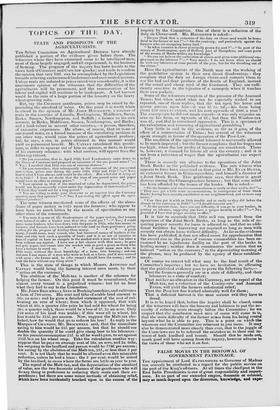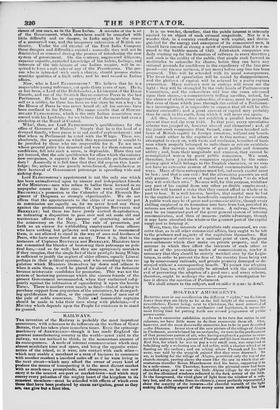FALSE MOVES IN THE BESTOWAL OF GOVERNMENT PATRONAGE.
THE appointment of Lord ELPHINSTONE as Governor of Madras can scarcely be attributed to a regard for the public service on the part of the King's advisers. At all times the chief post in the East India Presidencies is one of great responsibility and import- ance. In no part of our extended empire, domestic or colonial. may so much depend upon the discretion, knowledge, anti exile •. thence-of one man, as in the East Indies. A mistake of the of the Government, which elsewhere could be remedied with little difficulty and no danger, in India might be the cause of a- protrutted war, and the temporary subversion of British au- thority, Under the old charter of the East India Company these dangers and difficulties existed : assuredly they will not be diminished or removed during the process of introducing the new system of government. On the contrary, augmented diligence, superior sagacity, extended knowledge of the habits, feelings., and interests of the inhobitants of our Indian empire, will be re- quired to form a safe ruler of any of the Presidencies. The per- son who is intrusted with such a charge, should possess states- manlike qualities of a high order, and be well versed in Indian affairs.
Now, who is Lord ELPHINSTONE ? We believe that he is a respectable young nobleman, mot quite thirty years of age. He is, or has been, a Lord of the Bedchamber, a Lieutenant of the Horse Guards, and one of the Scuttish Repreentative Peers in the last Parliament. He has had no opportunity of distinguishing him- self as a soldier, for there has been no war since he was a buy ; in the House of Peers be was never heard of; all his services have been confined to the Palace. His name recalls that of MOUNT- STUART ELPHINSTONE, which is the only Indian association Con- nected with his Lordship; ler we believe that he never had even a clerkship at the Board of Control.
What, then, are Lord ELPHINSTONE'S qualifications for the office of Governor of Madras? Simply that he is the head of a decayed family, whose purse is in sad need of replenishment; and that when in Parliament he voted with the Whigs. These are, absolutely, the grounds on which this appointment is sought to be justified by those who are responsible for it. To see men whose general policy has deserved and won fur them esteem and confidence, fall into such a smite, is deplorable. Have they not yet learned, that the sole qualification for office which the country now recognizes, is capacity for the best possible performance of duty ? Assuredly it is full time that they did acquire this know- ledge; for, unless we are greatly misinformed, dissatisfaction at their bestowal of Government patronage is spreading wide and sinking deep.
Lord ELPHINSTONE'S appointment is not the only one which has been animadverted upon by sincere and independent friends of the Ministers—men who refuse to halloo them forward in an unpopular course to their ruin. We last week noticed Lord BRUDENELL'S promotion to the Colonelcy of the Eleventh Re- giment of Dragoons as strongly objectionable. We do not affirm that the appointments to the ships of war recently put in commission are equally so, for we never heard any thing against the professional reputation of Captains BOUVERIE and BERKELEY; but these too have justly excited dissatisfaction, as indicating a disposition to pass over and set aside old and meritorious officers for the purpose of quartering scions of the aristocracy on the Navy. The rule of promotion, put forth as an excuse for withholding employment from officers who have nothing but gallantry and experience to recommend them, is not allowed to stand in the way of sons and brothers of Peers, who have never faced an enemy. True it is, that in the instances of Captains BOUVERIE and BERKELEY, Ministers have
not committed the blunder of bestowing their patronage on poli- tical foes,—and so far well ; but they are egregiously mistaken if they imagine, that the single fact of their protégés being Whigs is sufficient to justify the neglect of older officers, equally Liberal perhaps in their political opinions, and who according to the re- gulation which Ministers themselves lay down and adhere to when it suits them, would be placed far ahead of -the fortunate
because aristocratic candidates for promotion. This was not the system of bestowing patronage which the sincere friends of the
present Government recommended, when they exclaimed indig- nantly against the infatuation of squandering it upon the hostile Tories. There is another error nearly as fatal—that of seeking to
purchase support from any section of the aristocracy, by disregard-
ing qualification for office, or the superior claims of men out of the pale of noble connexion. Noble aad honourable captains should be made to take their turn along with plebeians,—if a Ministry which depends upon the People for existence is to stand its ground.



























 Previous page
Previous page